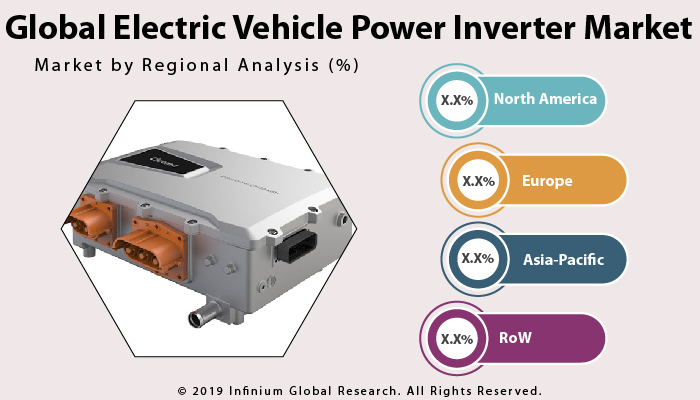Electric Vehicle Power Inverter Market (Vehicle Type - Battery Electric Vehicles (BEVs), Plug-in Electric Vehicles (PEVs), and Hybrid Electric Vehicles (HEVs); Inverter Type - Traction Inverter, and Soft-switching Inverter; Level of Integration - Integrated Inverter System, Separate Inverter System, and Mechatronic Integration System; Sales Channel - Original Equipment Manufacturer (OEM), and Aftermarket): Global Industry Analysis, Trends, Size, Share and Forecasts to 2025
A recent report published by Infinium Global Research on electric
vehicle power inverter market provides an in-depth analysis of segments and
sub-segments in the global as well as regional electric vehicle power inverter
market. The study also highlights the impact of drivers, restraints, and macro
indicators on the global and regional electric vehicle power inverter market
over the short term as well as long term. The report is a comprehensive
presentation of trends, forecast and dollar values of global electric vehicle
power inverter market. According to the report, the global electric vehicle
power inverter market is projected to grow at a healthy CAGR over the forecast
period of 2019-2025.
Market Insight
The world is shifting towards cars that use alternative energies
like electric motors, to conserve energy resources and decrease pollution
emissions for a cleaner environment. Traction inverters are crucial components
of modern electrified automotive powertrains. Advances in power electronics
have enabled lower-cost inverters with high reliability, efficiency and power
density, suitable for mass-market consumer automotive applications. In recent
years, green vehicles have become familiar sights on the road with growing
sales of hybrid electric vehicles and the arrival of the first mass-production
battery electric vehicles. Sales of these green vehicles are set to rise
further in the future with environmental regulations on CO2 and stringent
exhaust emissions.
Increasing demand for electric vehicles in developed and
developing countries is the major driving factor for the electric vehicle power
inverter market. Furthermore, factors such as rapid technological advancements
in the field of power electronics and growing stringent emission standards
across the globe are other driving factors for the market growth. The rise in
demand for an improved driving range of electric vehicles also fueling market
growth. The range and emission levels in electric vehicles depend on their
electronic powertrain control systems. Inverters play a major role in
controlling electronic powertrain. Increasing government support from various
countries across the globe for the production of electric vehicles is boosting
the growth of the market. However, more energy from the battery is taken to the
inverter considering switching losses and thermal efficiency of electronic
units in the electric drive system that restrains the market growth. Moreover,
implementation of in-wheel microinverter system is expected to provide growth
opportunities to the market players.
Geographically, Asia-Pacific dominates the global electric vehicle
power inverter market due to the high adoption of electric vehicles in
countries such as China and Japan. The rising charging station facilities in
Japan and China are fueling market growth. North America is the second-largest
market for electric vehicle power inverter owing to aggressive promotion of
electric vehicles by major players in this region.

Segment Covered
The report on global electric vehicle power inverter market covers
segments such as vehicle type, inverter type, level of integration, and sales
channel. On the basis of vehicle type, the sub-markets include battery electric
vehicles (BEVs), plug-in electric vehicles (PEVs), and hybrid electric vehicles
(HEVs). On the basis of inverter type, the sub-markets include traction
inverter, and soft-switching inverter. On the basis of the level of integration,
the sub-markets include integrated inverter system, separate inverter system,
and mechatronic integration system. On the basis of the sales channel, the
sub-markets include original equipment manufacturer (OEM), and aftermarket.
Companies Profiled:
The report provides profiles of the companies in the market such
as Robert Bosch GmbH, Hitachi Automotive Systems, Ltd., TOYOTA INDUSTRIES
CORPORATION, Infineon Technologies AG, Denso Corporation, Calsonic Kansei
Corporation, Meidensha Corporation, Aptiv PLC, Mitsubishi Electric Corporation,
and other companies.
Report Highlights:
The report provides deep insights into the demand forecasts, market trends, and micro and macro indicators. In addition, this report provides insights into the factors that are driving and restraining the growth in this market. Moreover, The IGR-Growth Matrix analysis given in the report brings an insight into the investment areas that existing or new market players can consider. The report provides insights into the market using analytical tools such as Porter's five forces analysis and DRO analysis of electric vehicle power inverter market. Moreover, the study highlights current market trends and provides forecast from 2019-2025. We also have highlighted future trends in the market that will affect the demand during the forecast period. Moreover, the competitive analysis given in each regional market brings an insight into the market share of the leading players.
Please Choose One of them.